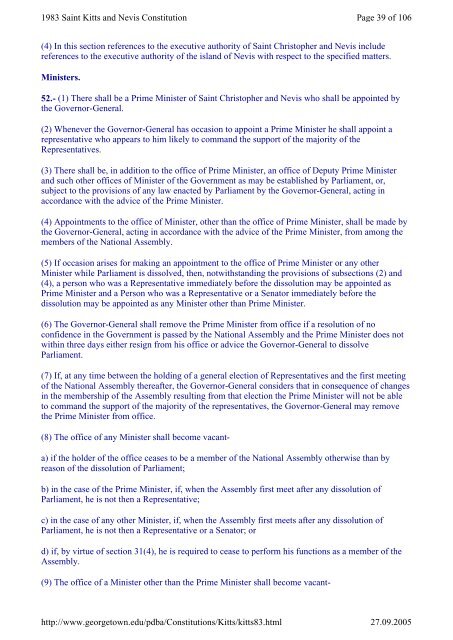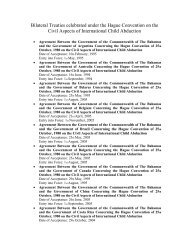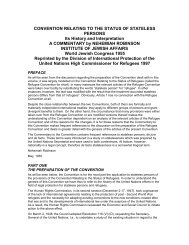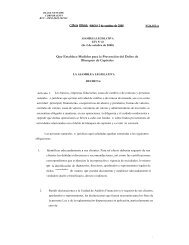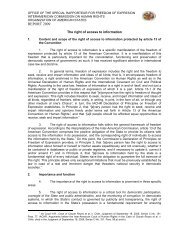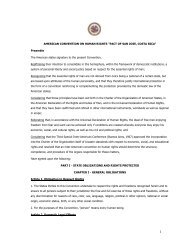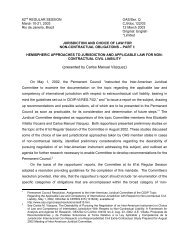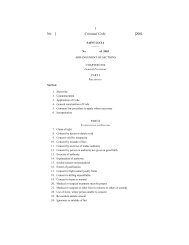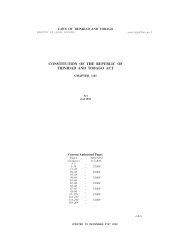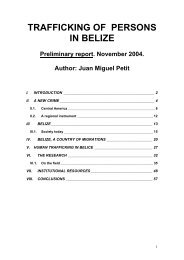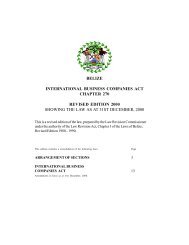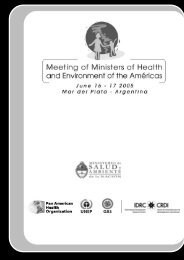Constitution St-Kitts-Nevis - ICRC
Constitution St-Kitts-Nevis - ICRC
Constitution St-Kitts-Nevis - ICRC
Create successful ePaper yourself
Turn your PDF publications into a flip-book with our unique Google optimized e-Paper software.
1983 Saint <strong>Kitts</strong> and <strong>Nevis</strong> <strong>Constitution</strong><br />
Page 39 of 106<br />
(4) In this section references to the executive authority of Saint Christopher and <strong>Nevis</strong> include<br />
references to the executive authority of the island of <strong>Nevis</strong> with respect to the specified matters.<br />
Ministers.<br />
52.- (1) There shall be a Prime Minister of Saint Christopher and <strong>Nevis</strong> who shall be appointed by<br />
the Governor-General.<br />
(2) Whenever the Governor-General has occasion to appoint a Prime Minister he shall appoint a<br />
representative who appears to him likely to command the support of the majority of the<br />
Representatives.<br />
(3) There shall be, in addition to the office of Prime Minister, an office of Deputy Prime Minister<br />
and such other offices of Minister of the Government as may be established by Parliament, or,<br />
subject to the provisions of any law enacted by Parliament by the Governor-General, acting in<br />
accordance with the advice of the Prime Minister.<br />
(4) Appointments to the office of Minister, other than the office of Prime Minister, shall be made by<br />
the Governor-General, acting in accordance with the advice of the Prime Minister, from among the<br />
members of the National Assembly.<br />
(5) If occasion arises for making an appointment to the office of Prime Minister or any other<br />
Minister while Parliament is dissolved, then, notwithstanding the provisions of subsections (2) and<br />
(4), a person who was a Representative immediately before the dissolution may be appointed as<br />
Prime Minister and a Person who was a Representative or a Senator immediately before the<br />
dissolution may be appointed as any Minister other than Prime Minister.<br />
(6) The Governor-General shall remove the Prime Minister from office if a resolution of no<br />
confidence in the Government is passed by the National Assembly and the Prime Minister does not<br />
within three days either resign from his office or advice the Governor-General to dissolve<br />
Parliament.<br />
(7) If, at any time between the holding of a general election of Representatives and the first meeting<br />
of the National Assembly thereafter, the Governor-General considers that in consequence of changes<br />
in the membership of the Assembly resulting from that election the Prime Minister will not be able<br />
to command the support of the majority of the representatives, the Governor-General may remove<br />
the Prime Minister from office.<br />
(8) The office of any Minister shall become vacanta)<br />
if the holder of the office ceases to be a member of the National Assembly otherwise than by<br />
reason of the dissolution of Parliament;<br />
b) in the case of the Prime Minister, if, when the Assembly first meet after any dissolution of<br />
Parliament, he is not then a Representative;<br />
c) in the case of any other Minister, if, when the Assembly first meets after any dissolution of<br />
Parliament, he is not then a Representative or a Senator; or<br />
d) if, by virtue of section 31(4), he is required to cease to perform his functions as a member of the<br />
Assembly.<br />
(9) The office of a Minister other than the Prime Minister shall become vacant-<br />
http://www.georgetown.edu/pdba/<strong>Constitution</strong>s/<strong>Kitts</strong>/kitts83.html<br />
27.09.2005


